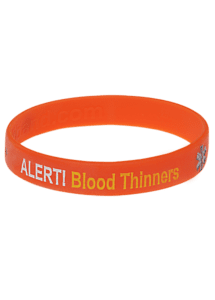Blood Thinners & What to Look Out For in an Emergency
Blood thinners are medications that are prescribed to patients who are at risk of suffering from strokes and heart attacks. Blood thinner medicines prevent blood from clotting and are helpful in treating some types of heart disorders.
You may need blood thinners if:
- You’re suffering from atrial fibrillation
- You are at risk of pulmonary embolism
- You’ve just had artificial heart valve surgery
- You’ve recently undergone hip replacement or bone surgery
Types of Blood Thinners
There are two common types of blood thinners available—anticoagulants and antiplatelet drugs. Antiplatelet drugs prevent thrombotic cerebrovascular and cardiovascular diseases by inhibiting blood clot formation. These drugs don’t allow platelets to adhere to one another, thereby reducing the formation of blood clots. Aspirin, clopidogrel, prasugrel, and Ticlopidine are the most commonly antiplatelet medications.
Anticoagulants cause a few chemical reactions in the body that increase the time it takes for a blood clot to form. Warfarin was one of the most common anticoagulant drugs several years ago. Newer drugs like Apixaban, Dabigatran, Rivaroxaban, and Edoxaban, often work just as well and carry the same risks as most anticoagulant medications.
As you can see, blood thinners don’t thin the blood. They only prevent or slow down the formation of blood clots. Anticoagulants and antiplatelet medications can’t dissolve pre-existing blood clots either. They can, however, inhibit the growth of existing blood clots and prevent the formation of new ones.
Symptoms to Look Out For

Although the latest-generation blood thinners lower your chance of suffering from a stroke they do carry certain risks. Patients who take blood thinners may suffer from bleeding-related problems. Their cuts and bruises take longer to heal because the blood doesn’t clot as fast as it should. Antiplatelet drugs often increase the risk of bleeding in the brain and gastrointestinal tract. Patients who take antiplatelet medications like Ticlopidine are also at greater risk of suffering from a condition known as thrombotic thrombocytopenic purpura (TTP). TTP is characterised by the formation of tiny blood clots in the body. Patients with TTP may have a limited blood supply to certain organs or parts of the body. The medication is also known to cause other blood-related problems like reduced white blood cell formation, which is why it comes with a big warning on the label.
Patients suffering from TTP require prompt medical attention. Such patients will benefit from the use of blood thinner wristbands or medical IDs. With the wristband, anyone who looks can clearly see the patient needs to be hospitalized early and given the right care. Patients taking blood thinners should also watch for other symptoms like red or brown urine, bleeding from the gums, headaches, delayed healing of bruises, blood in the vomit, and tarry stools.
Are Blood Thinner Wristbands Helpful?
Patients who are bleeding excessively or those who have had falls because of the dizziness caused by blood thinners require prompt medical attention. The wristband warns people of the patient’s medical condition and helps save lives. Blood thinner wristbands carry a patient’s vital medical information. One look at the band and the emergency response team will know the patient’s entire medical history.

Mediband carries an excellent range of attractive blood thinner wristbands. If you decide to use the Mediband database to store all your health related information, you could use the band in conjunction with the database for complete protection. Health professionals will have access to your medical records by using the information provided on your wristband. There won’t be any delays in emergency situations, and the doctors will be able to treat you with the right medications.
Blood thinner wristbands are affordable, trendy and they’re always readily customizable. You can also ask for a wallet card to keep your medical information handy in your purse or wallet. Blood thinners have their advantages and disadvantages. It’s best to work with your GP to find out which drug is best for you. Have you also considered how to have your health care wishes known? Read Handband's blog on health care wishes for more information.


1 Comment